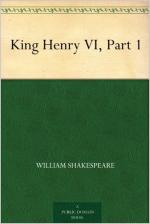|
This section contains 10,397 words (approx. 35 pages at 300 words per page) |

|
SOURCE: MacKenzie, Clayton G. “Myth and Anti-Myth in the First Tetralogy.” Orbis Litterarum 42 (1987): 1-26.
In the following essay, MacKenzie examines how the classical and biblical mythic references in the Henry VI plays reflect and subvert the heroic ideals of English mythology.
To the Elizabethan translator Philemon Holland, mythology is “a fabulous Narration: or the delivery of matters by way of fables and tales”1 and mythologers are those who expound such “Morall Tales.”2 Neither the First Tetralogy nor its author wholly correspond to either definition. The plays, as mythology, fall short of a “fabulous Narration,” and the rôle of Shakespeare, as mythologer, is not focused exclusively on ethical matters:
When first this order was ordain'd, my lords, Knights of the Garter were of noble birth, Valiant and virtuous, full of haughty courage, Such as were grown to credit by the wars; Not fearing death nor shrinking for distress...
|
This section contains 10,397 words (approx. 35 pages at 300 words per page) |

|


